Kurdish parties have called for the recognition of Kurdistan and a solution to the Kurdish question in Amed, stating that the Treaty of Lausanne is no longer valid and the parties should apologise.
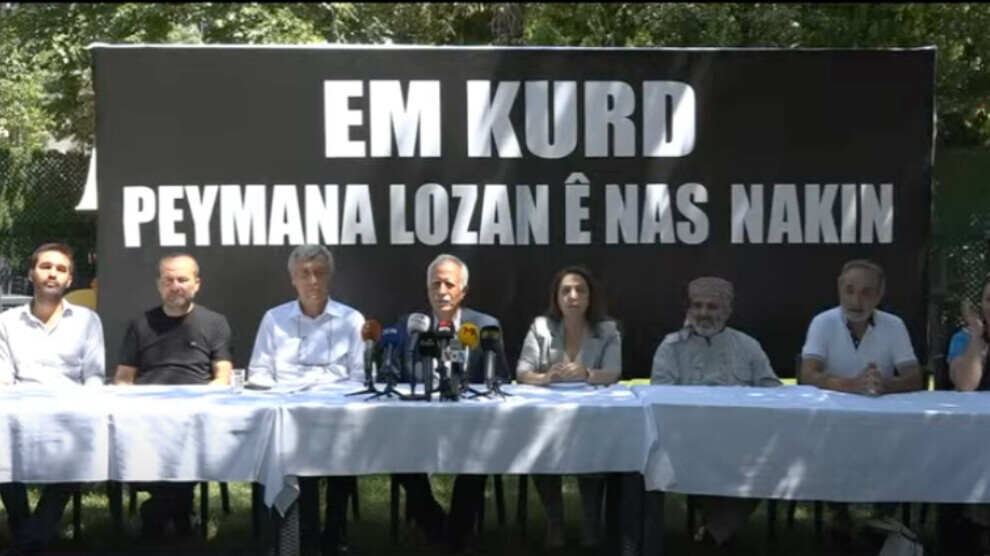
In Amed (tr. Diyarbakir), political parties and civil society organisations issued a joint declaration on the Treaty of Lausanne, which was signed a hundred years ago. The representatives of the Democratic Regions’ Party (DBP), Peoples’ Democratic Party (HDP), Green Left Party, Kurdistan Communist Party (KKP), Party for Human and Freedom (PIA), Kurdistan Socialist Party (PSK), Kurdistan Democratic Party-Turkey (PDK), Freedom Party (Partiya Azadî), Freedom Movement, Revolutionary Democratic Kurdish Association (DDKD), Şeyh Said Association and Kurdish Women’s Union Platform made a joint statement on the 100th anniversary of the Treaty of Lausanne and demanded the recognition of the Kurdish people and an apology from the contracting parties of Lausanne.
The statement was read out by PSK General Secretary Bayram Bozyel in Kurdish and by DBP Chairperson Saliha Aydeniz in Turkish. The conclusion of the Lausanne Treaty on 24 July 1923 was described as a black day, with which a hundred years of rejection, denial and massacres began for the Kurdish people, said the statement, which includes the following:
“One hundred years have passed since the imperialist states and colonialists compromised among themselves and divided Kurdistan into four parts, disregarding the will of our people. The Treaty of Lausanne of 24 July 1923 stands for the darkness, endless oppression, genocide and persecution of our people. First and foremost, we strongly condemn the Treaty of Lausanne, in which our people were not represented and their will was ignored, and those who signed and implemented it. We did not and will not accept the Treaty. Our people will continue their struggle to overcome the Treaty of Lausanne with the aim of realising the right of national self-determination.
During the process of the disintegration of the Ottoman Empire, the support of the Kurds was requested and it was expressed that the state of Turkey to be established would be a common state of Turks and Kurds. However, immediately after the signing of the Treaty of Lausanne, all promises were forgotten. The government in Ankara, whose existence was officially recognised by the Treaty of Lausanne on 24 July 1923, proclaimed the Republic three months later, on 29 October 1923. With the proclamation of the Republic, the rejection and refusal of the Kurdish people was legalised and formalised. The Republic of Turkey was founded on a monist and racist basis on Turkishness and ignored the multinational, multicultural and multireligious structure of the geography on which it was founded.
The 1924 Constitution introduced a concept of citizenship that denied the existence, language and culture of the Kurdish people and considered all people living in Turkey as Turks. The Eastern Reform Plan of 1925 laid the foundation for a century of military regimes, inspections and emergency systems in Kurdistan. It officially banned the Kurdish language, set the goal of de-Kurdifying Kurdistan and planned mass killings to achieve this goal.
The Kemalist regime, which consisted of cadres of the Unity and Progress Committee, continued the policy of Turkification and centralisation that the Ottoman Empire had started in the 1850s and continued with massacres in the republican period. The Kemalist regime suppressed the national liberation uprisings and resistances in 1921 in Koçgiri, 1925 Şeyh Said, 1928-30 Agirî/Zîlan and 1938 in Dersim by all means, including massacres. It carried out a policy of cultural genocide against the Kurdish language and culture that lasted for a hundred years.
This monist and racist policy has continued as a state strategy for a hundred years, using different forms and instruments, but its essence is unchanged: Today, the attacks on the achievements of our people continue in the Kurdistan Region [South Kurdistan] and in the autonomous region of Rojava [West Kurdistan]. In North Kurdistan, the will of our people is being usurped and trustees are being appointed to the local governments. The Kurdish parties are being cornered with the threat of closure, operations against political cadres are being carried out continuously and a strict isolation policy is being carried out in disregard of any laws. Nevertheless, the national liberation struggle of our people has continued uninterruptedly and continues with the same determination.
The Kurdish struggle for freedom is taking place in all four parts of Kurdistan. In the southern part of Kurdistan, our people have achieved federal status since 2005. In the south-west of Kurdistan, the Kurdish people are on the threshold of important opportunities for freedom. We consider the official establishment of the Regional Government of Kurdistan and the Autonomous Administration of Rojava in a de facto federal structure as very important achievements. The establishment of two federal administrations is an important step on the way to the national liberation of our people and to overcome the Lausanne Treaty of 1923. In East and North Kurdistan, our people have gained important positions in the struggle for national liberation.
In the current phase, the only key to the freedom of the Kurdish people is comprehensive national unity, dialogue and solidarity. Let us not forget that the Kurdish people lost in the Lausanne process a hundred years ago mainly because they were not able to build a national alliance. We can win the 21st century with a policy that builds a national alliance, enlarges the circle of friends and reduces the circle of enemies. With this policy, Kurdish politics can overcome the obstacles to national freedom, seize the opportunities and abrogate the Treaty of Lausanne.
We call on the signatory states of the 1923 Lausanne Treaty, especially Britain and France, who played an important role in the second partition of Kurdistan at the beginning of the last century and left the Kurdish people without status, to apologise to our people and support the struggle to overcome Lausanne. We call on the UN, the Council of Europe, the EU and other international organisations to support our people’s struggle for self-determination and to overcome the straitjacket of Lausanne.
The Kurdish people want to live the next century together with the peoples of the region, especially the Turkish, Persian and Arab peoples, on the basis of equality in all areas. It is struggling to create conditions for coexistence on the basis of equal political and geographical status, not through continued rejection and denial, but through recognition of its land and national identity.
We call on the Turkish state to fulfil the requirements of fraternity instead of the speeches that have been repeated for a hundred years, such as ‘We founded the republic together, Kurds and Turks are the two founding elements of the republic, we have been brothers for a thousand years’. Instead of the policy of war and denial, steps should be taken for a peaceful and democratic solution to the Kurdish question. A new constitution should officially recognise the existence of the Kurdish people and their rights arising from belonging to a nation. The Kurdish people have the right to live freely and with dignity in their own country of Kurdistan, and this is a prerequisite for peace and stability in the region.”


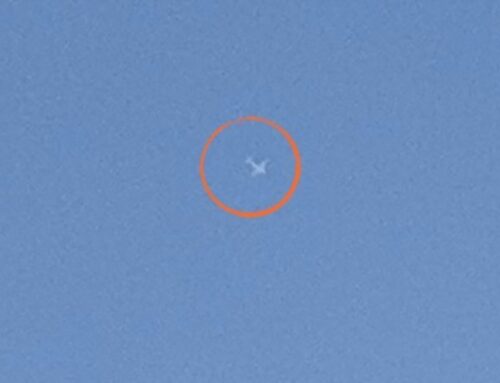
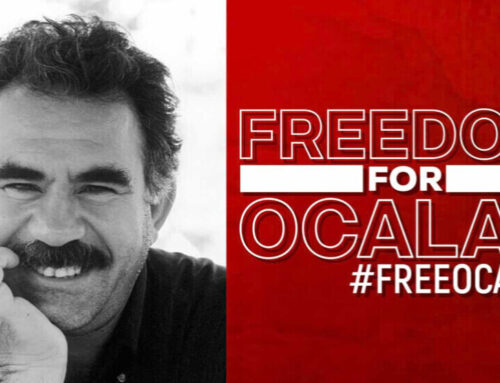
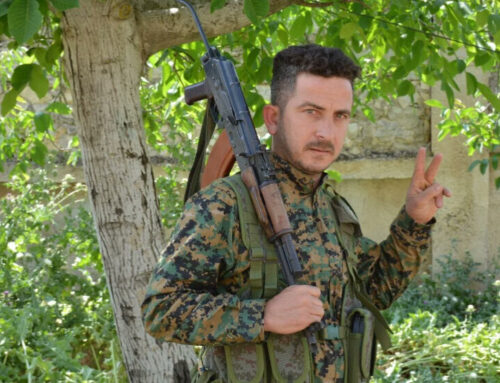
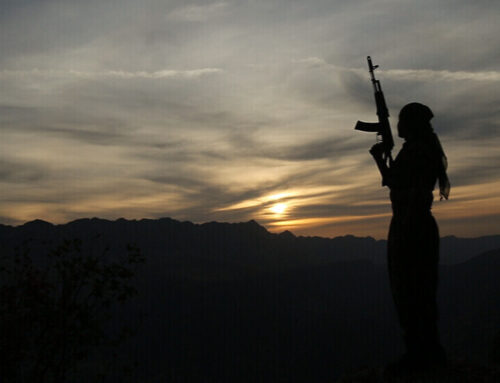
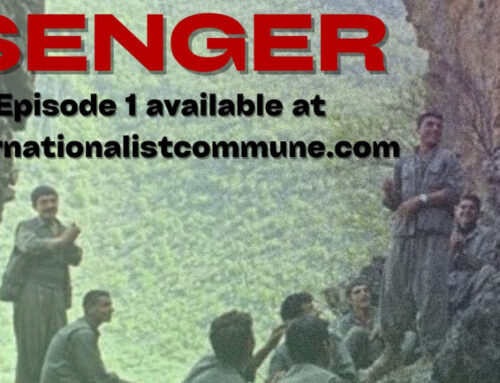

Leave A Comment